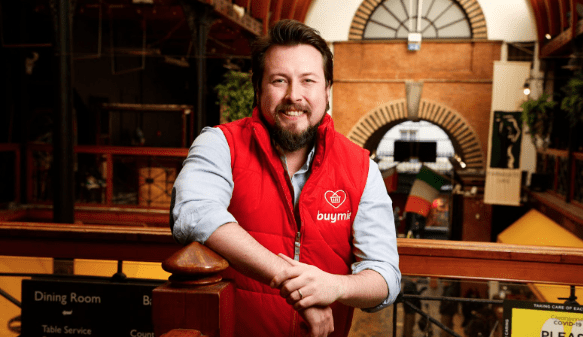Pictured: Devan Hughes, CEO & Co-Founder of buymie
Devan Hughes is the CEO & Co-Founder of buymie, the online grocery delivery service.
Note: This piece was originally published in Business & Finance magazine, vol. 59, no. 2, available to read, with compliments, here.
“Not many people are aware, but buymie is actually half Irish and half Armenian, and with that, our company was born with remote working at its very core.”
We’re all sick of talking about it, but there is no getting away from it. COVID has changed businesses and leadership practices permanently.
In the past 24+ months, every leader around the world has been faced with the same daunting task, to rethink their entire management and communication strategy, not only for their direct reports but for their entire organisations.
I have spent some time pondering this very question, and in doing so have boiled it down to 2 key fundamentals. 2 areas that have been radically impacted as a result of our new remote working environment, and are intrinsically linked to one another.
Culture
For any business to thrive in the competitive labour environment we find ourselves in today, it is vital to invest time and thought into building a strong and engaging culture within your business. Without it, engagement with employees becomes highly transactional in nature, resulting in high levels of staff turnover and a slow down of business progress and the hollowing out of deep domain expertise and knowledge.
Not many people are aware, but buymie is actually half Irish and half Armenian, and with that, our company was born with remote working at its very core. In fact, the very first time I met my co-founder, Art, in person, was at a dinner in London 1.5 years into the business’s life, and by that point Unilever had offered to purchase 3% of the company. The tools many companies discovered in COVID, like slack, zoom and many others, were core to our business long before they were core to every business.
However, going fully remote, brought challenges for us as a growing business, particularly as we tried to build culture during a period of rapid expansion.
One of our first steps to achieve our goal was to establish a formal set of core values within the business and making sure that, as a leadership team, we really did live those values on the daily.
Also in a world where we are not around each other, it is increasingly important to take the time to recognise and call out the great work of people across your organisation. Appreciation and respect are the fundamentals of every great relationship in life, and the relationship between an organisation and its employees is no different. So pay attention to the individual contributors in your business and tap into that discretionary effort by showing them they are seen, heard and most importantly, appreciated.
Information transfer
This is one challenge I believe can fly under the radar. We all know information is power and in any business, the transfer of information can be a sticky topic fraught with practical and philosophical barriers. To share or not to share, that is the question.
On top of that, in a world of working from home and dialling into meetings with colleagues, we are seeing far less proximity-based information sharing between people. Gone are the water cooler chats and information flow by osmosis.
My personal approach to leadership has always been built on a deep commitment to transparency and trust, in particular when it comes to communication with my stakeholders, both internal and external.
What I mean, is that as a leader I need to be willing to share the good and the bad with my team, trusting that in sharing this, they will do what needs to be done to support the company’s mission and objectives.
I am not talking about broadcasting all the ins and outs of the entire business. However, all too often I see leaders play it way too safe, sharing only the bare minimum with their stakeholders and then being entirely surprised that they get the same effort in return.
Since buymie’s inception and as we moved to 100% remote throughout COVID we have held monthly town halls for the entire company, and in these sessions focused entirely on sharing real strategic insights to team members of all levels about how the business is performing, operationally and financially, where we are winning and where we need to improve. Second, we actively focus on creating a safe environment for meaningful dialogue across the business and different teams, encouraging input and healthy challenge and debate.
This approach is very easy when you are a small business with 5 – 10 people, but as the business grows it does become more challenging. Sometimes it feels uncomfortable and risky, as a leader, to be so open and honest, but with our business now at 70 full-time people across 3 countries and growing, it is a core part of our culture that we are deeply committed to and I encourage others to think about.
So what’s the connection between these two things?
Why are these two points so intrinsically linked?
Well, it’s my belief that to create a truly great culture within a business, your people need to feel like they belong. This sense of belonging rarely comes from their payslip or their perks. It comes from a feeling of being appreciated for what they do, while also being given the autonomy to do it. It also means being given access to, and being trusted with, strategic company information that gives them a clear view of not just the achievements and goals, but also the very real challenges faced by the company.

